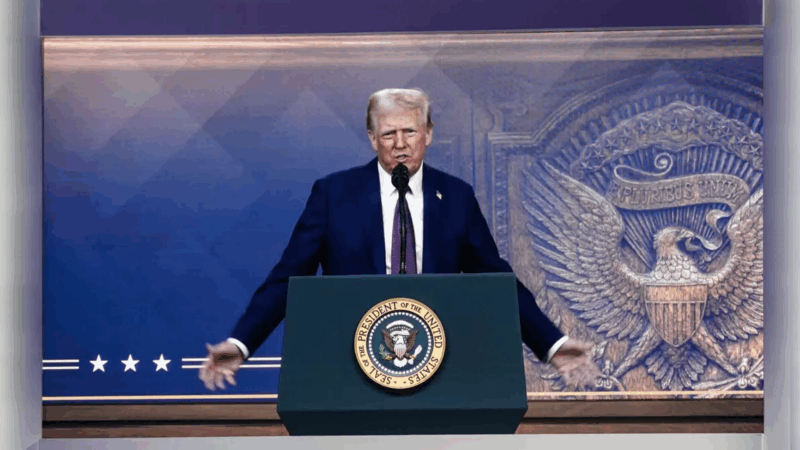The 'Emergency' That Demanded Huge Tariffs on Swiss Imports Is Now Over. So What Was the Emergency?
Trump's decision to reduce the tariffs on Swiss goods came just days after a Swiss delegation lavished the president with a variety of expensive gifts.

When President Donald Trump ordered a whopping 39 percent tariff on all imports from Switzerland earlier this year, he did so, of course, by claiming there was a national emergency.
Officially, Trump's executive order pointed to "large and persistent annual U.S. goods trade deficits" that, the president claims, "constitute an unusual and extraordinary threat to the national security and economy of the United States." Because this was part of Trump's push for what he called "reciprocal" tariffs, the executive order also pointed toward "foreign trading partners' disparate tariff rates" that were supposedly to blame for the trade imbalance.
Right from the start, that didn't make a whole lot of sense.
For one, Switzerland had minuscule tariffs (an average rate of 0.2 percent) on American imports. As I pointed out at the time, if Trump were seeking "reciprocal" tariffs with the Swiss, he would have to lower America's tariffs rather than raise them.
For another: The very existence of a U.S. trade deficit with Switzerland (which totaled $38.3 billion last year) seemed to undermine the entire logic behind Trump's trade war. If having higher tariffs than your trading partner was the secret to ending trade deficits, as the Trump administration seems to believe, then why did America have a trade deficit with a country like Switzerland in the first place?
Still, possibly the most confusing part of this announcement was the premise that imported chocolate, pharmaceutical drugs, and fancy watches somehow constitute an emergency requiring a huge (and possibly unlawful) expansion of executive power. If Americans want to buy things from people and businesses in Switzerland, that doesn't seem like it should be any of the president's business.
Good news: That emergency is now over!
The White House announced over the weekend that tariffs on imports from Switzerland would be cut from 39 percent to 15 percent—the same level charged to goods from the European Union. "President Trump's unmatched dealmaking continues to deliver for the American people," gushed U.S. Trade Representative Jamieson Greer in an official statement announcing new deals with Switzerland and its tiny neighbor, Liechtenstein.
"This framework tears down longstanding trade barriers that have held U.S. exporters back," Greer continued. Finally, America's blue-collar workers will be free from Liechtensteiner oppression.
But has the emergency actually been resolved? Through July, America had posted a $55 billion trade deficit with Switzerland this year, according to Census Bureau data. More recent data are not yet available, but the White House is claiming that Trump's newly inked trade deals with a variety of countries, including Switzerland, have achieved "reciprocal trade" amid other "historic wins" for the American people.
We'll have to wait a few more months to find out if that is true, or if the president simply decided that the trade deficit with Switzerland was no longer an urgent national emergency.
Cynical observers might note that Trump's decision to reduce the tariffs on Swiss goods came just days after a Swiss delegation lavished the president with a variety of expensive gifts. Trump reportedly received a gold Rolex watch and an engraved gold bar estimated to be worth $130,000. It is illegal for U.S. presidents to accept gifts worth more than $480, but the White House says Trump accepted the gifts on behalf of his presidential library, which likely makes them legal.
It wouldn't be the first time Trump responded favorably after receiving some luxurious enticements. In August, Trump granted Apple a special exemption from huge tariffs targeting high-end computer chips made in other countries just days after Apple CEO Tim Cook made a special trip to the White House and left behind a 24-karat gold tchotchke for the president.
There are two possibilities here. You can believe that the vaguely defined economic emergency that required such huge tariffs on Swiss imports is already over, just a few months after those tariffs were imposed and despite the trade deficit seemingly growing rather than shrinking. If so, then you have to accept that Americans peacefully exchanging their money for chocolates, drugs, and watches were somehow undermining America's economic security for years—but that those exact same transactions are now totally fine, because of the higher tariffs that no longer exist.
The other possibility is that no such emergency ever actually existed, and that the president's idea of what constitutes an emergency depends largely on who is paying him homage and what gifts they might leave behind. If so, then you'd have to question the entire rationale behind all of Trump's so-called reciprocal tariffs, many of which make no more sense than the ones imposed on Swiss goods.
And you'd have to wonder whether Trump's trade war is really aimed at benefitting the country—or reducing the trade deficit, or promoting manufacturing jobs, or whatever rationale the White House is trotting out today. As it stands, the stakes appear to be significantly more personal.


Show Comments (80)